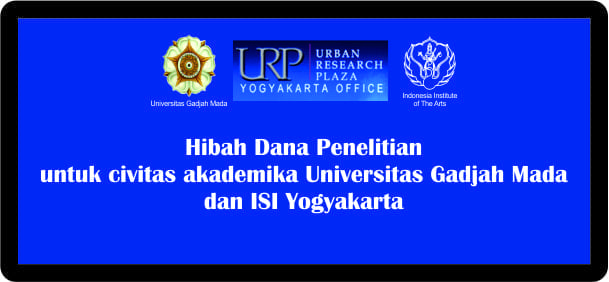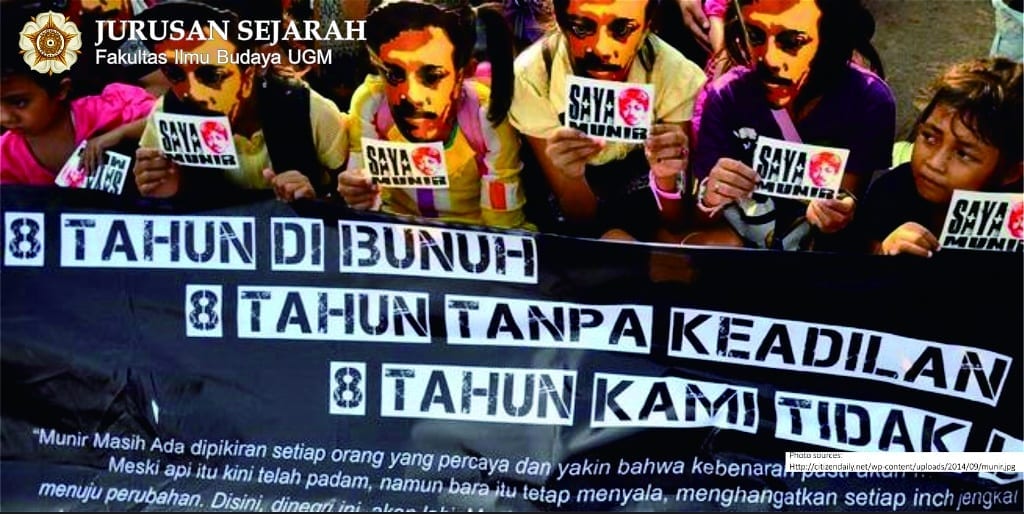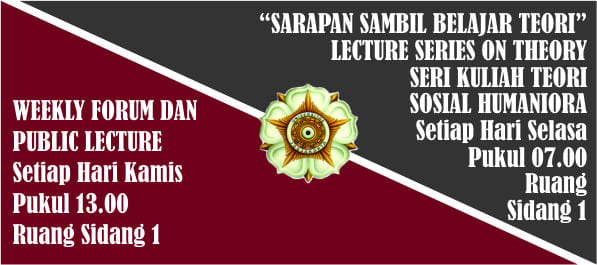13th Urban Research Forum
Time : March 5, 2015
Venue : Multimedia Room 3rd floor, Rectorat Building UGM
Time : 08.00 – 16.00 WIB
Speakers : 8 persons
1. Prof. Dr. Hiroyuki Hashimoto (Otemon Gakuin University)
2. Mr. Kiener Johannes (Osaka City University)
3. Dr. Abdul Wahid, M.Hum., M.Phil. (History Dept., Universitas Gadjah Mada)
4. Dr. Suzie Handajani, M.A. (Anthropology Dept., Universitas Gadjah Mada)
5. Indro Baskoro M. P., S.Sn. (Institut Seni Indonesia Yogyakarta)
6. Irwandi, S.Sn., M.Sn. (School of Recorded Media Arts, Institut Seni Indonesia Yogyakarta)
7. Diananta Pramitasari, Ph.D. (Architecture and Planning Engineering Department, Universitas Gadjah Mada)
8. UGM Faculty of Social and Political Sciences (in confirmation)
Chairperson: 1. Dr. Laksmi Adriani Savitri, M.Si. (Anthropology Dept., UGM)
2. Dr. Fortunata Tyasrinestu, M.Si. (Faculty of Art Performance ISI Yogyakarta)
(in confirmation)
Terms of References
(1) Each speaker will give a 20 minutes presentation in English.
(2) The abstract and short CV need to be submitted to the committee
on February 12, 2015 to urp.fib@ugm.ac.id
(3) The full paper presentation and the power point need to be submitted to
the committee on March 1, 2015 at the latest.
Condition
The committee covers acommodation during the seminar.
The Theme of Urban Research Plaza Forum 2015:
“Urban Cultural Innovation: Making A Social Channel with Excluded People”
Urban area can be defined as a meeting place where individuals from different places with diverse cultural backgrounds interact. But still, we never realized that the exclusion still occurs in urban area across the world, for example, towards the disabled people, less fortunate people, LGBT, people with certain health illness, elderly people, etc. As the impacts, they are not holding the same opportunities to access public or urban spaces, although everybody is entitled to have the same opportunities and rights to access public spaces, albeit their gender, race, religion, or social condition. This is the main theme of the 13th Urban Research Plaza, how to make an urban cultural innovation and making a social channel with excluded people using the perspective of social, science, culture, and humanities.
By delivering this theme, the attention will be drawn into how excluded people in urban areas can merge into wider social interaction and become a short of new innovatif culture. It is important to learn how this so called urban cultural innovation has shaped the live of the excluded people and it has become a vehicle for the agents of culture to explore its potential in the present and future to articulate their ‘voices’ and existency in the communities.
It is necessary to reconsider the relationship between art and culture as it can be used as a tool to create greater social access and engagement within marginalized community. It also can be used to develop networking and to expand a community’s role from audience to active participants. It always offers a new model for art in the urban context. Art and cultural integration is absolutely needed when used as a tool to provide wide access for community in solving increasingly complex social issues, particularly in urban community.
Introduction
URP (Urban Research Plaza) of Osaka City University
The Urban Research Plaza was opened in April 2006. It is a brand new research center created by Osaka City University. The University has put its energy into urban studies, and produced results befitting a metropolitan university.
As its name indicates, the strongest feature of Urban Research Plaza is its framework, based on the image of a ‘public square.’ Unlike ordinary graduate schools and research institutions, Urban Research Plaza does not house permanent facilities or staff members who do research within the facilities and contribute to society with their research results. Instead, the Urban Research Plaza features small, re-locatable satellites (‘field plazas’ and overseas centers) to be opened in Osaka and foreign cities, in addition to the small number of staff and core facilities (Takahara Hall) located at the university campus. Its staff members constantly go out into the field and go abroad for research and activities for community development. With this in mind, the Urban Research Plaza serves as the center of networks for research and urban revitalization, or an open forum where people gather and meet around the theme of ‘cities.’
Cities are supposed to be an arena where new knowledge and culture is created through encounters and discourse amidst a gathering of a large number of people unknown to each other. The Urban Research Plaza is aimed at creating a research organization in urban settings of the 21st century that will implement a wide variety of endeavors with its unique structure and approach.
Osaka is currently a ‘city of suffering’ which faces the greatest problems in Japan in more ways than one. The philosophy of the Urban Research Plaza is to be a research institution in accord with Osaka City’s communities, and to share pain, pleasure and rage with the citizens.
Overseas Center of URP
Urban Research Plaza Yogyakarta Office
The Urban Research Plaza (URP) Yogyakarta Office was established by Osaka City University in cooperation with the Indonesia Institute of the Arts (ISI) and Universitas Gadjah Mada (UGM) as one of overseas satellite centers of URP in Osaka, Japan. It is located in Faculty of Cultural Sciences UGM and was first known as Urban Culture Research Center (UCRC). Though the cooperation had been started long ago since year 2003 but the sub-center had just been effectively running only after year 2006 following name-shifting from UCRC into URP.
Very small number of officials does not hamper the office to actively inviting local scholars, practitioners and governmental elements the sub center annually holds an international forum to discuss urban issues aiming to spread the spirit of urban studies and to find the best possible solutions for urban problems.




